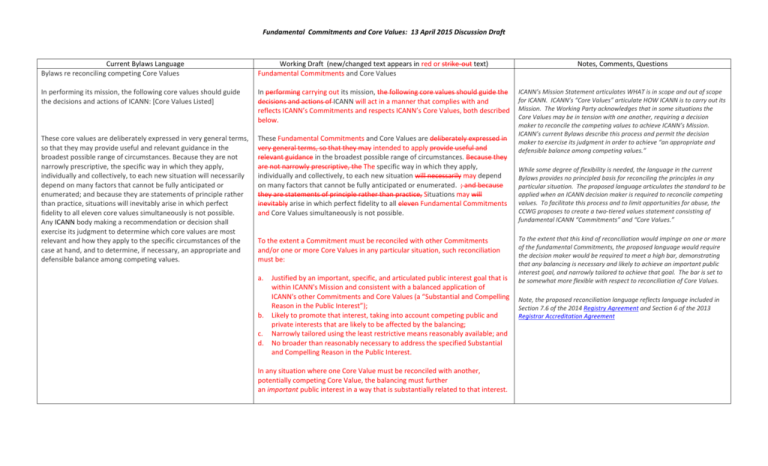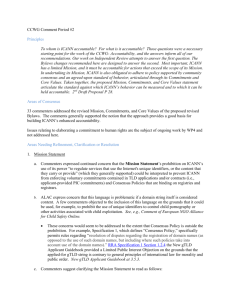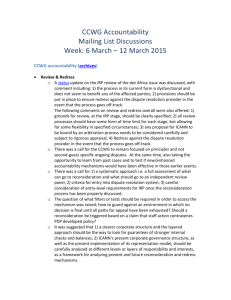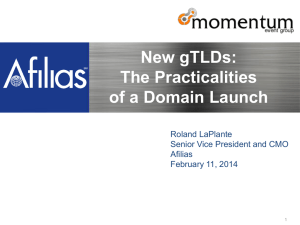4-13 Annotated Commitments and Core Values Language
advertisement

Fundamental Commitments and Core Values: 13 April 2015 Discussion Draft Current Bylaws Language Bylaws re reconciling competing Core Values Working Draft (new/changed text appears in red or strike-out text) Fundamental Commitments and Core Values In performing its mission, the following core values should guide the decisions and actions of ICANN: [Core Values Listed] In performing carrying out its mission, the following core values should guide the decisions and actions of ICANN will act in a manner that complies with and reflects ICANN’s Commitments and respects ICANN’s Core Values, both described below. These core values are deliberately expressed in very general terms, so that they may provide useful and relevant guidance in the broadest possible range of circumstances. Because they are not narrowly prescriptive, the specific way in which they apply, individually and collectively, to each new situation will necessarily depend on many factors that cannot be fully anticipated or enumerated; and because they are statements of principle rather than practice, situations will inevitably arise in which perfect fidelity to all eleven core values simultaneously is not possible. Any ICANN body making a recommendation or decision shall exercise its judgment to determine which core values are most relevant and how they apply to the specific circumstances of the case at hand, and to determine, if necessary, an appropriate and defensible balance among competing values. These Fundamental Commitments and Core Values are deliberately expressed in very general terms, so that they may intended to apply provide useful and relevant guidance in the broadest possible range of circumstances. Because they are not narrowly prescriptive, the The specific way in which they apply, individually and collectively, to each new situation will necessarily may depend on many factors that cannot be fully anticipated or enumerated. ; and because they are statements of principle rather than practice, Situations may will inevitably arise in which perfect fidelity to all eleven Fundamental Commitments and Core Values simultaneously is not possible. To the extent a Commitment must be reconciled with other Commitments and/or one or more Core Values in any particular situation, such reconciliation must be: a. b. c. d. Justified by an important, specific, and articulated public interest goal that is within ICANN's Mission and consistent with a balanced application of ICANN's other Commitments and Core Values (a “Substantial and Compelling Reason in the Public Interest”); Likely to promote that interest, taking into account competing public and private interests that are likely to be affected by the balancing; Narrowly tailored using the least restrictive means reasonably available; and No broader than reasonably necessary to address the specified Substantial and Compelling Reason in the Public Interest. In any situation where one Core Value must be reconciled with another, potentially competing Core Value, the balancing must further an important public interest in a way that is substantially related to that interest. Notes, Comments, Questions ICANN’s Mission Statement articulates WHAT is in scope and out of scope for ICANN. ICANN’s “Core Values” articulate HOW ICANN is to carry out its Mission. The Working Party acknowledges that in some situations the Core Values may be in tension with one another, requiring a decision maker to reconcile the competing values to achieve ICANN’s Mission. ICANN’s current Bylaws describe this process and permit the decision maker to exercise its judgment in order to achieve “an appropriate and defensible balance among competing values.” While some degree of flexibility is needed, the language in the current Bylaws provides no principled basis for reconciling the principles in any particular situation. The proposed language articulates the standard to be applied when an ICANN decision maker is required to reconcile competing values. To facilitate this process and to limit opportunities for abuse, the CCWG proposes to create a two-tiered values statement consisting of fundamental ICANN “Commitments” and “Core Values.” To the extent that this kind of reconciliation would impinge on one or more of the fundamental Commitments, the proposed language would require the decision maker would be required to meet a high bar, demonstrating that any balancing is necessary and likely to achieve an important public interest goal, and narrowly tailored to achieve that goal. The bar is set to be somewhat more flexible with respect to reconciliation of Core Values. Note, the proposed reconciliation language reflects language included in Section 7.6 of the 2014 Registry Agreement and Section 6 of the 2013 Registrar Accreditation Agreement Fundamental Commitments and Core Values: 13 April 2015 Discussion Draft Current Bylaws Section 2. CORE VALUES. In performing its mission, the following core values should guide the decisions and actions of ICANN: Proposed - Working Draft Fundamental Commitments. In performing its mission, the following core values should guide the decisions and actions of ICANN: ICANN must operate for the benefit of the Internet community as a whole, carrying out its activities in conformity with relevant principles of international law and applicable law and international conventions and through open and transparent processes that enable competition and open entry in Internet-related markets, and the Fundamental Rights set forth below. Specifically, ICANN’s action must: NOTES This additional language is derived from ICANN’s current Articles of Incorporation. This language also supports Affirmation of Commitments language, including Section 3, in which ICANN “commits to: (a) ensure that decisions made related to the global technical coordination of the DNS are made in the public interest and are accountable and transparent; (b) preserve the security, stability and resiliency of the DNS; (c) promote competition, consumer trust, and consumer choice in the DNS marketplace; and (d) facilitate international participation in DNS technical coordination.” 1. Preserving and enhancing the operational stability, reliability, security, and global interoperability of the Internet. 1. Preserveing and enhanceing the operational stability, reliability, security, global interoperability, resilience, and openness of the DNS and the Internet; In AoC Section 8, ICANN commits to maintain the capacity and ability to coordinate the Internet DNS at the overall level and to work to maintain a single, interoperable Internet. In AoC Section 9.2, ICANN commits to preserve the security, stability and resiliency of the DNS. 2. Respect the creativity, innovation, and flow of information made possible by the Internet by limiting ICANN's activities to matters that are within ICANN’s mission and requireing or significantly benefit from global coordination; 3. Employ open, transparent and bottom-up, multistakeholder policy development mechanisms processes that (i) promote well-informed decisions based on expert advice, and (ii) ensure that those entities most affected can assist in the policy development process. 2. Respecting the creativity, innovation, and flow of information made possible by the Internet by limiting ICANN's activities to those matters within ICANN's mission requiring or significantly benefiting from global coordination. 8. Making decisions by applying documented policies neutrally and objectively, with integrity and fairness. Bylaws Section 3: ICANN shall not apply its standards, policies, procedures, or practices inequitably or single out any particular party for disparate treatment unless justified by substantial and reasonable cause, such as the promotion of effective competition. 10. Remaining accountable to the Internet community through mechanisms that enhance ICANN's effectiveness. 4. Makeing decisions by applying documented policies consistently, neutrally, objectively, and fairly, with integrity and fairness without singling out any particular party for disparate discriminatory treatment unless justified by substantial and reasonable cause, such as the promotion of effective competition; In AoC Section 8, ICANN commits to “operate as a multistakeholder, private sector led organization with input from the public, for whose benefit ICANN shall in all events act.” The changes in the current Bylaws for Core Value #8 reflect and incorporate current Bylaws Section 3. On NON-DISCRIMINATORY TREATMENT. The OED defines “disparate” as “Essentially different in kind; not able to be compared.” “Discriminatory” is defined as “making or showing an unfair or prejudicial distinction between different categories of people or things.” This change was suggested by one of the CCWG’s independent experts. Fundamental Commitments and Core Values: 13 April 2015 Discussion Draft 5. Remaining accountable to the Internet Community through mechanisms defined in the Bylaws that enhance ICANN’s effectiveness. In AoC Section 9.1, ICANN commits to maintain and improve robust mechanisms for public input, accountability, and transparency.” Core Values: In performing its mission, the following core values should guide the decisions and actions of ICANN: Core Values: In performing its mission, the following core values should also guide the decisions and actions of ICANN: 4. Seeking and supporting broad, informed participation reflecting the functional, geographic, and cultural diversity of the Internet at all levels of policy development and decision-making. 1. Seeking and supporting broad, informed participation reflecting the functional, geographic, and cultural diversity of the Internet at all levels of policy development and decision-making. 3. To the extent feasible and appropriate, delegating coordination functions to or recognizing the policy role of other responsible entities that reflect the interests of affected parties. 2. To the extent feasible and appropriate, delegating coordination functions to or recognizing the policy role of other responsible entities that reflect the interests of affected parties and the roles of both ICANN’s internal bodies and external expert bodies; 5. Where feasible and appropriate, depending on market mechanisms to promote and sustain a competitive environment. 3. Where feasible and appropriate, depending on market mechanisms to promote and sustain a healthy competitive environment in the DNS market In AoC Section 9.3, ICANN commits to promote “competition, consumer trust, and consumer choice.” 6. Introducing and promoting competition in the registration of domain names where practicable and beneficial in the public interest. 4. Introducing and promoting competition in the registration of domain names where practicable and beneficial in the public interest. In AoC Section 9.3, ICANN commits to promote “competition, consumer trust, and consumer choice.” 5. Operate with efficiency and excellence, acting in a fiscally responsible and accountable manner and at a speed that is responsive to the needs of the Internet. In AoC Section 7, ICANN “commits to adhere to transparent and accountable budgeting processes.” 6. While remaining rooted in the private sector, recognizing that governments and public authorities are responsible for public policy and duly taking into account the public policy advice of governments and public authorities in accordance with the Bylaws and to the extent consistent with these Fundamental Commitments and Core Values. In AoC Section 8, ICANN commits to “operate as a multistakeholder, private sector led organization.” 7. [Not advance] [Refrain from advancing] the interests of one or more interest groups at the expense of others 9. Acting with a speed that is responsive to the needs of the Internet while, as part of the decision-making process, obtaining informed input from those entities most affected. 11. While remaining rooted in the private sector, recognizing that governments and public authorities are responsible for public policy and duly taking into account governments' or public authorities' recommendations. In AoC Section 7, ICANN commits to “fact-based policy development, cross-community deliberations, and responsive consultation procedures that provide detailed explanations of the basis for decisions, including how comments have influenced the development of policy consideration.”


